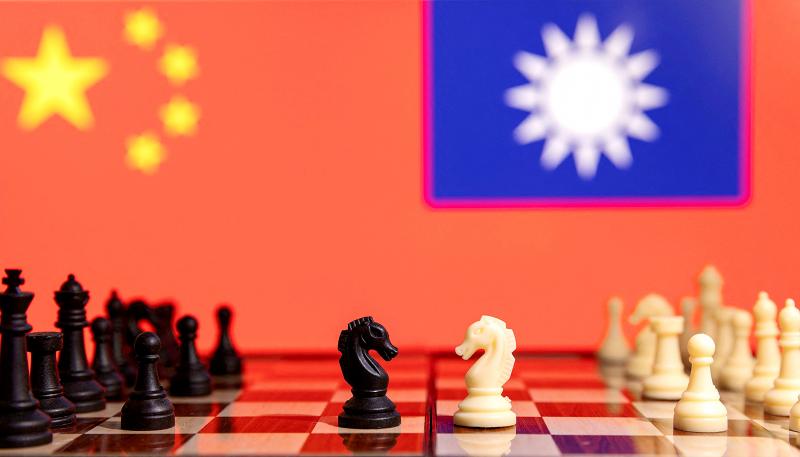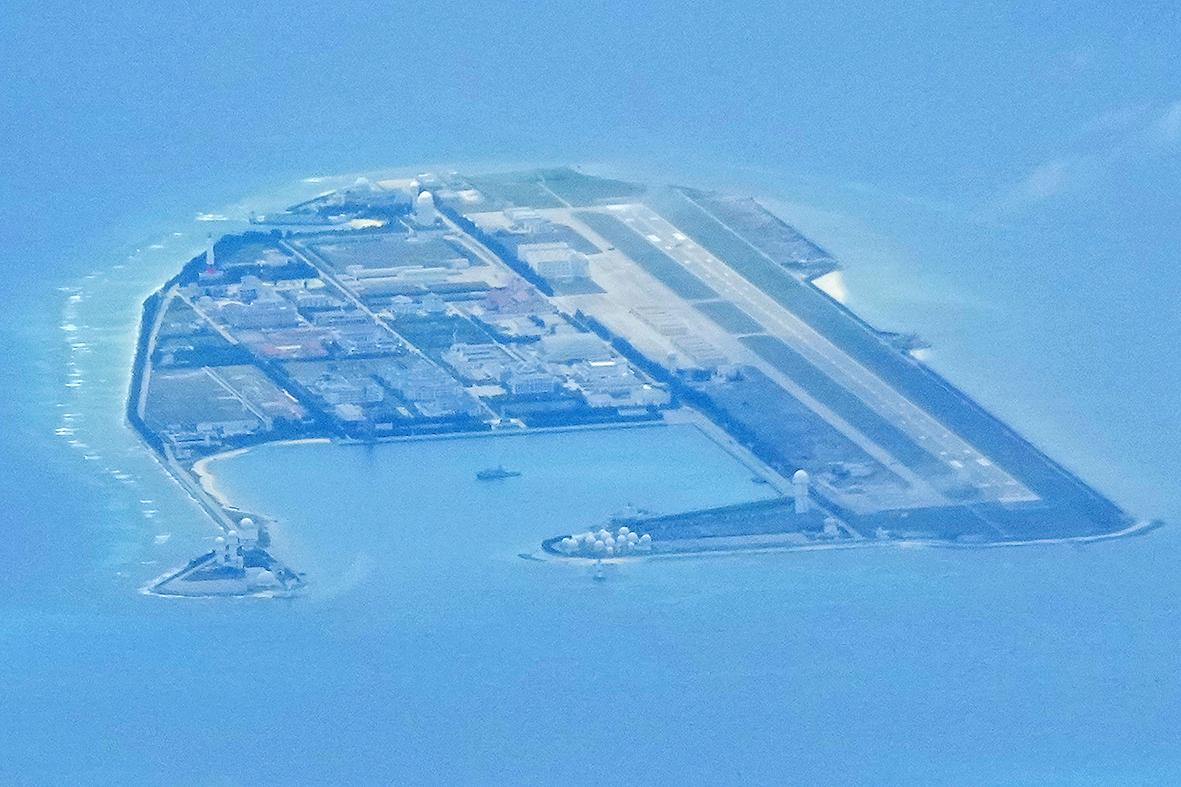The media kaleidoscope last week gave us another collage of seemingly unrelated news stories. Out of Russia the flow of news stories in which Russian commentators and politicians claimed that Ukraine was not a real country and that Ukrainians were actually Russians continued.
Meanwhile a Hong Kong drama called Barrack O’Karma was pilloried in the international press for using a Hong Kong-Canadian actress of Chinese descent in blackface to play a Filipino maid in a TVB TV series.
“Actress Franchesca Wong (黃婉華) blacked herself to play a foreign domestic worker, but she is actually a beautiful woman,” described a headline in the local news site, HK01.

Photo: Reuters
The article even offered up an image of her blacking her legs, as if to reinforce the idea that the exotic was erotic. Netizens quoted in the article marveled at her “accent.” The racism was obvious, and vile.
Here in Taiwan, meanwhile, the Ministry of Labor was busy responding once again to a US State Department human rights report highlighting the mistreatment of migrant workers. The ministry replied with the perennial “we’re working on it.”
Different though they may be, these events are linked by their display of identical ethnonationalism and racism. That racism is more than just a hidebound attitude that harms both locals and their guests, it is vital issue of national security.

Photo: AP
Reading the news out of Russia and the commentaries of scholars on Russia attitudes toward minorities in Russia, toward history and toward the newly formed nations along its border, it is obvious to many Taiwan observers that the ethnonationalism of Russia and China are akin to one another.
Not only do the Russians argue that Ukraine is a fake nation, just as the Chinese do with Taiwan, but they also make the usual absurd claims about the Russian language being richer and more beautiful than others, that everything was invented or discovered by Russians and that the minorities the Russian empire rules over have no culture of their own worth knowing about.
In Russian attacks on the idea of Ukrainian independence and unique culture, many of us watching from Taiwan heard echoes of the same ethnonationalist and exterminationist rhetoric out of China — that when China attacks, it should “leave the island intact, forget the people (留島不留人).”
The security threat from Han ethnonationalism in China is obvious. It is easy to see the Han-Chinese racism and chauvinism when it is directed at Taiwan. It is not difficult to see it when it looms over locals’ relationships with their maids from Indonesia and Philippines, and in the status of local indigenous people.
Harder, though, to grasp its effects on our foreign policy. As I have noted before, the Taiwan Public Opinion Foundation polled Taiwanese in 2019 and found that the Philippines was the second most disliked country. Yet in a war with China Taiwan will need the support of Manila, which could well be a convenient staging ground for weapons and other supplies from further afield.
In researching this story, I was reminded that the nation’s civil defense plans make no provision for the specific problems of the hundreds of thousands of migrant workers whose toil drives Taiwan economy forward. How will Manila and Jakarta react when their workers are threatened by Chinese missiles but neglected by the Taiwan government?
Conversely, the fact that the Taiwanese love and admire Japan and consider it a “higher status” country may well influence the island’s acceptance of closer security relationships with that nation. Meanwhile the lands full of brown people to the south, though they are next door to Taiwan and face the same expansionist threat, are seldom thought of in terms of security partnerships.
Moreover, consider another aspect of Taiwan’s ethnonationalist immigration policies: people of recognized “Chinese” descent have an easier time. There is also an entire government agency aimed at overseas ethnics.
These policies are a reminder of the ethnonationalism that, like a malign spirit, animates the Republic of China’s (ROC) imperial view of the world. Other nations in the area can sense that contempt for their people.
Time to do something about that.
Last week Sweden and Finland declared that they would join NATO, demonstrating for all to see the strategic genius of Russian President Vladimir Putin. At a stroke Putin has isolated Russia, decimated its military and brought together as allies nations which previously had independent foreign stances.
Putin also did everyone a favor by rendering hollow the idea of “Finlandization,” perhaps sparing Taiwan a few silly articles in the future.
Ukraine’s success against Russia, symbolized by the spectacular sinking of the Moskva, the flagship of the Russian Black Sea Fleet, should not make Taiwanese complacent. Rather, the decisions of the Finns and Swedes highlight Taiwan’s desperate need for cozier relations with its neighbors to the south.
Taiwan needs allies and friends. Rather than view the flow of weapons to Ukraine as evidence for how strong international support can work, Taiwan should take a good hard look at the success Russia has had in getting its point of view across in non-Western world. That world surrounds Taiwan, and it has had very equivocal experiences with Taiwan and its fisherman, its factories and its diplomacy.
China, which is supporting Russia, already has the information infrastructure in place to support Russian style information programs when it moves on Taiwan. As Patrick Cronin and Ryan Nuehard wrote two years ago in a report for the Center for a New American Security, the diplomatic, informational, military and economic instruments of national power are used in unique ways by China, which “generally orients them toward achieving psychological advantages.”
In the coming war everyone is going to be surprised by how little sympathy there is for Taiwan among its neighbors, even though China will likely move on them next. Taiwan too suffers from the Ukrainian President Volodymyr Zelensky effect: its image is excellent, but largely in the advanced democracies.
“China is a big country and you are small countries, and that is a fact,” Chinese Central Foreign Affairs Commission Director Yang Jiechi (楊潔篪) of China famously said at the ASEAN Regional Forum in Hanoi in 2010.
China could be made to eat those words, every day.
But how can it? In bureaucracy and diplomacy Taiwan too often behaves as though it acts on behalf of a vast imperial state, complete with that state’s ethnonationalism, not a middle-sized country threatened by a vast imperial state. Instead of assiduously cultivating allies, it treats states to its south largely as economic targets divorced from its security concerns.
Yet the proposal by China a few years again to construct a “smart city” on Fugu Island off Luzon, in the Bashi Strait just opposite Taiwan, should remind Taipei that Beijing sees its economic relationships as security relationships.
Taiwan should, too.
Notes from Central Taiwan is a column written by long-term resident Michael Turton, who provides incisive commentary informed by three decades of living in and writing about his adoptive country. The views expressed here are his own.

A vaccine to fight dementia? It turns out there may already be one — shots that prevent painful shingles also appear to protect aging brains. A new study found shingles vaccination cut older adults’ risk of developing dementia over the next seven years by 20 percent. The research, published Wednesday in the journal Nature, is part of growing understanding about how many factors influence brain health as we age — and what we can do about it. “It’s a very robust finding,” said lead researcher Pascal Geldsetzer of Stanford University. And “women seem to benefit more,” important as they’re at higher risk of

Eric Finkelstein is a world record junkie. The American’s Guinness World Records include the largest flag mosaic made from table tennis balls, the longest table tennis serve and eating at the most Michelin-starred restaurants in 24 hours in New York. Many would probably share the opinion of Finkelstein’s sister when talking about his records: “You’re a lunatic.” But that’s not stopping him from his next big feat, and this time he is teaming up with his wife, Taiwanese native Jackie Cheng (鄭佳祺): visit and purchase a

Experts say that the devastating earthquake in Myanmar on Friday was likely the strongest to hit the country in decades, with disaster modeling suggesting thousands could be dead. Automatic assessments from the US Geological Survey (USGS) said the shallow 7.7-magnitude quake northwest of the central Myanmar city of Sagaing triggered a red alert for shaking-related fatalities and economic losses. “High casualties and extensive damage are probable and the disaster is likely widespread,” it said, locating the epicentre near the central Myanmar city of Mandalay, home to more than a million people. Myanmar’s ruling junta said on Saturday morning that the number killed had

Mother Nature gives and Mother Nature takes away. When it comes to scenic beauty, Hualien was dealt a winning hand. But one year ago today, a 7.2-magnitude earthquake wrecked the county’s number-one tourist attraction, Taroko Gorge in Taroko National Park. Then, in the second half of last year, two typhoons inflicted further damage and disruption. Not surprisingly, for Hualien’s tourist-focused businesses, the twelve months since the earthquake have been more than dismal. Among those who experienced a precipitous drop in customer count are Sofia Chiu (邱心怡) and Monica Lin (林宸伶), co-founders of Karenko Kitchen, which they describe as a space where they